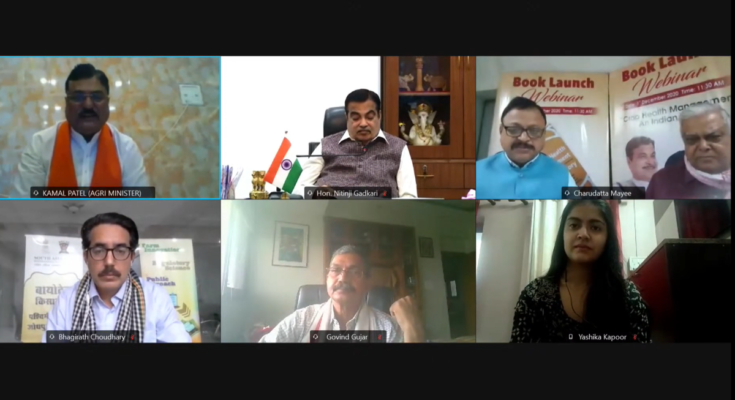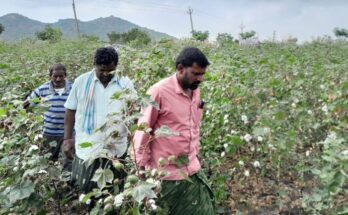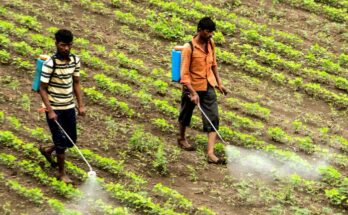Year 2020 has been regarded by the United Nations as the International Year of Plant Health (IYPH). In this context, the South Asia Biotechnology Centre (SABC), a not-for-profit organisation, has prepared a comprehensive book “Crop Health Management – An Indian Story”, upholding the essence of the year. The book is a seminal work to the cause of nation’s global campaign for crop health management. Going beyond a discussion about agriculture and crop protection in India, the book presents an account of the current scenario and prospects about crop health management in a simple to understand and effective manner. While covering the various aspects of integrated pest management (IPM), Indian pesticide industry, biocontrol, organic farming, and other issues, the authors, Dr. CD Mayee, Govind Gujar, Yashika Kapoor, and Bhagirath Choudhury have presented new scientific and business dimensions of crop health. The book provides an overview of multiple farming methods including organic farming and IPM practical aspects, aiming to accelerate sustainable farming and food production in India.
Union Minister for Road, Transport and Highways and Minister of Micro, Small and Medium Enterprises (MSME) Nitin Gadkari released the book, published by South Asia Biotechnology Centre, in the presence of Kamal Patel, Minister of Agriculture and Farmers’ Welfare, Government of Madhya Pradesh. Gadkari has dedicated the book as a tribute to 140 million farmers’ families and scientific fraternity whose work and insights have supported the nation’s self-reliance in food production. “The book on crop health management embodies a significant body of knowledge and contribution of India in the global campaign of crop health,” said Gadkari.
Caring for plant health in the international year of plant health 2020 and beyond, Gadkari stressed need for developing disease free planting material through biotechnological approaches including tissue culture. As this approach becomes more common, we might be able to produce disease-free planting material on cost effective basis for many crops”, said Gadkari.
“Highlighting that judicious use of pesticides, balanced with other tactics and integrated nutrient management (INM) and a thrust on organic farming can significantly aid both agriculture and the environment,” said Kamal Patel, Minister of Agriculture and Farmers’ Welfare, Government of Madhya Pradesh.
“Despite the serious crop damage and production losses from pest infestation, the country continues to enhance its food production during each successive year, with Madhya Pradesh contributing significantly to wheat, pulses and oilseed production”, Patel said.
The foreword from Dr. Trilochan Mohapatra, Director General, Indian Council of Agricultural Research (ICAR) highlights that agricultural science in the event of increasing population aims at increasing food production. As agriculture becomes increasingly intensive, farmers are faced with the burden of generating higher yields while balancing the financial and environmental stresses. The products of scientific endeavours, such as fertilisers and pesticides, help cost-effectively improve production. However, at the same time, sustainable agriculture needs to manage environmental costs, such as minimising pollution, habitat loss, supporting landscape, and protecting wildlife. Thus, the book “Crop Health Management: An Indian Story” outlines the different aspects of crop health and crop protection.
“The book shining in its hues of orange brings enthusiasm about India’s achievements for crop health management and where the future path can lead”, said Dr. CD Mayee, President, South Asia Biotechnology Centre. Every chapter implores different aspects of crop protection, tackling the issues with a sense of narrative. The inspiration for the various sections comes from the real-life issues where on the one hand, the agricultural operations need to balance human activities with the safeguard of the environment while on the other hand, the Indian farmers require knowledge upgrade and easy access to technical know-how. The regulatory frameworks, persisting myths, and potential areas have also been identified and targeted to present a holistic and balanced view, added Dr Mayee.
Speaking on the occasion, Ravi Boratkar, President, Agrovision Foundation, Nagpur recounted the field experiences of working with SABC to manage the pink bollworm in cotton in Vidarbha region as part of national campaign on “War on Pink bollworm” and invited farmers to take part in the 12th Agrovision, Central India’s leading Agri Summit in February 2020.
Key objectives of the book
- Creating awareness of challenges that Indian agriculture is facing especially in respect to abiotic and biotic stresses that crops are subjected to.
- Defining and propagating awareness for integrated pest and nutrient management that includes responsible use of agrochemicals, biopesticides, agronomic, biological, biotechnological, preventive, and legal approaches
- Preventing misuse of pesticides and encouraging their responsible use, demystifying notions of pesticides association with safety and environment.
- Challenges and opportunities in agrochemical sector in India
- Pesticide Management Bill 2020 and its need for a balanced regulatory framework to encourage IPM based crop health management




